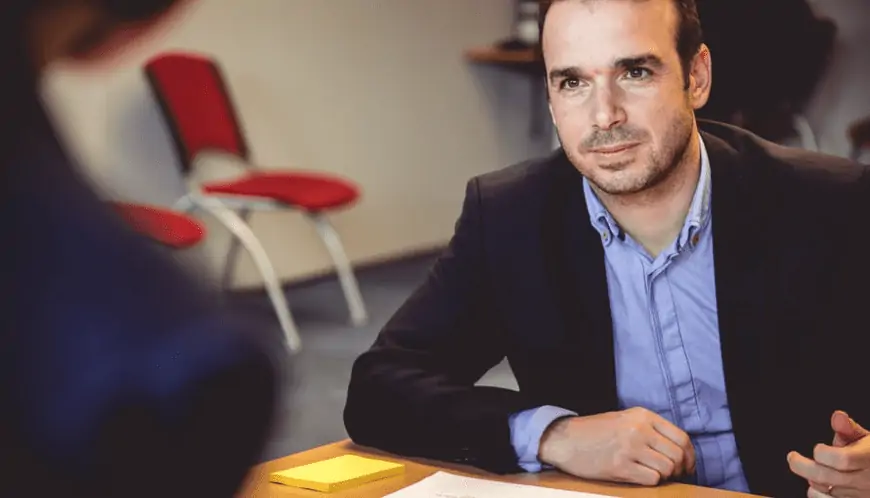Interview Question: Describe a Stressful Situation And How You Handled It (17+ Successful Examples)

We know that we’re going to be asked a whole bunch of questions when we’re in a job interview. Though we don’t know exactly what they’ll be, there are definitely common interview questions you should expect to be asked.
When you’re asked to ‘describe a stressful situation and how you handled it’, know that it’s one of the go-to questions for an interviewer/ HR manager. There are a few different routes you could take and we’ve got all of these covered in the following sample answers you could use in your interview.
Describe a stressful situation and how you handled it: What they really want to know…

Coming in with a prepared response is going to look far better than if you get stuck trying to think of what to say when they ask this. Find the most suitable response to your own experience in the answers below.
Interview Question: Describe a Stressful Situation & How You Handled It (17 Tips & Examples)

Deadlines creating the stress
When it comes to time constraints and deadlines, these examples can be used when answering ‘describe a stressful situation and how you handled it.’
Example 1: “What helps me when there is a looming deadline is to set out a clear daily schedule of how I can not only devote time to this task but also what I need to focus on most in the whole project.
In my last job, I was getting close to handing in some work, and I still had a lot to complete, so I sat down and broke up all the parts that I needed to do and ordered them by the one that was the highest priority down to the one that could be done last. Then I made a schedule for what I could tackle each day. Taking it day by day and doing it segmented like that helps me reach deadlines.”
Example 2: “Something that really helps me stay motivated and inspired to reach a deadline is to actually focus on the end result that I want to create, and the impact that this will have on the greater work that is being done in the company.
That gives me the energy I need to do what I have to do in time because I know that it is serving a greater purpose. An example of this in my last job was when I knew that I had to finish off a proposal for my team to then start working on it. So I reminded myself that they would get so much value from the work that I’m doing now to help them create the next steps, and that kept me on task.”
Recommended Course: Productivity Masterclass (Skillshare)
Example 3: “In order to keep moving forward in the face of a deadline, and not feel the pressure overwhelm me, I focus on only the essential parts of the task, and I actually leave the parts that I can’t do yet out of my mind.
In the past, what I did was make a list of what is essential, and didn’t even look at the later steps, so that I only had a few things to focus on and I felt so much more clear. Then later, I could tackle the next steps and still feel clear.”
Example 4: “For me, it’s all about planning. I use tools like excel and group collaboration software to keep on task and to work out where others are in their work process so that we can all feel on top of the work. Without these tools, I used to feel the collective stress of the office, but once we implemented it, we can handle deadlines much more easily.”
Other people creating the stress

When you’re asked to describe a stressful situation and how you handled it, you could reflect on when it was about other people creating the stress.
Example 5: “In my previous job, there was a difficult person in our team that seemed to get very agitated when things did not go her way and when she was faced with other opinions. She was stressed a lot of the time, as we all worked in a team and it required us to all be flexible.
For me, I handled this situation of working with her by doing only what I needed to in the professional sense in communicating with her, and when I did not need to be around her, I removed myself from her presence and spent more time working alongside positive and motivated people.”
Example 6: “I found that my last role had a few people working in the team who were always stressed for some reason or another, but what helps me personally stay grounded, and handle the stress that came up daily in this environment, was regular exercise outside of work.
This had such a big impact in the way that I showed up in this role as level-headed and positive in my energy, even if others around me weren’t.”
Recommended Course: Managing Team Conflict (LinkedIn Learning)
Example 7: “Last year in my job we had a difficult co-worker who was creating a bit of drama around the office. Personally, I felt that it would not be right to let this continue, so I went to management and HR and just expressed my concerns about how it was affecting the team. Communication for me is vital to handle stressful situations.”
Example 8: “I know that my own response to stress will have a direct impact on others around me, so I maintain my own calm by taking time out in my day to clear my head. For example, last year when the office was all stressed out due to economic concerns, I took daily walks at lunch and sometimes go to a yoga class so that I could feel grounded and calm, even in the uncertainty.”
Stress from customers/clients

When you’re asked to describe a stressful situation and how you handled it by the interviewer, sometimes they are looking for how you relate to customers/clients.
Example 9: “I had a client once who was upset about a billing issue, and I was being talked to in a really negative way. I handled her stress by asking the right questions and really showing her that I wanted to understand, rather than trying to defend myself. That eased all of the tension and the issue was resolved quite quickly.”
Example 10: “I had a customer in the past take out their negativity on me when it came to getting the wrong order. It turned out to be a glitch in the system, so it was no one’s fault, but I handled that situation by just assuring them that no matter what had happened, we would find a solution. They calmed down once they knew I was on their side.”
Recommended Course: Conflict Resolution And De-Escaltion (Udemy)
Example 11: “Some clients can be very demanding and impolite, but I handle this stress by not taking their energy and negativity personally, and just knowing that that is their own ‘stuff’ and I don’t have to take on that energy myself in order to do my job effectively.”
Example 12: “I find that customers get the most stressed out when they think that they are not being heard. I personally have handled stressful situations in the past by just listening and being quiet, and letting them talk out what they need to and somehow the energy just dissolves and they are no longer upset.”
Stress when something goes wrong

There will always be something unexpected happening in our work. When it is a big thing, it can create stress, so you might have an example from your past like the ones below that you could use when you’re asked this in an interview.
Example 13: “Information gathering and knowing all the facts that I can is how I handle stress in an uncertain situation. In my last job, we didn’t know if we might be affected by the global economic crisis, so I spent some time researching our industry and it gave me more peace to know a little more about what was happening.”
Example 14: “When our software system crashed at my last role, that was stressful for everyone, so I personally handled that by finding a similar software program as soon as the crash happened. I brought this to management to see if we could use that so that we didn’t get overwhelmed. Problem-solving is one of my strengths.”
Recommended Course: Decision Making In High Stress Situations (Linkedin Learning)
Example 15: “I am thankfully a very adaptable person, so when we had a difficult day in the office with the power going out, I felt calm in knowing that we just needed to do what we could do, and that’s it for that day. Being flexible and accepting what is out of my control was what made me stay fully calm in that situation.”
Example 16: “I didn’t know if my job was secure when we were having company-wide cuts, and that was hard to hold. But I handled that stress by looking around for other roles just in case it happened so that I was prepared for anything. Preparation and planning are what helps me handle stress.”
Example 17: “When our suppliers were unable to provide what we needed in my last role, I used creative-thinking to diffuse some stress getting the team together and brainstorming ways that we could get those products, and how each of us could have a different task to make it happen.”
For more tips, check out my post on some weaknesses you can include when being interviewed.
References
- https://www.themuse.com/advice/3-ways-youre-messing-up-the-answer-to-how-do-you-deal-with-stressful-situations
- https://targetjobs.co.uk/careers-advice/interview-questions/473988-how-do-you-handle-stress-tricky-graduate-interview-question
- https://work.chron.com/handle-stressful-situations-questions-answers-23718.html
- https://www.myperfectresume.com/how-to/interview-tips/describe-a-time-when-you-needed-to-cope-with-a-stressful-scenario
